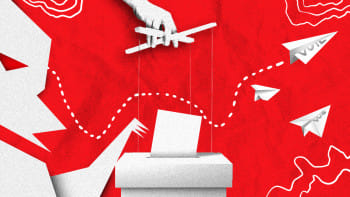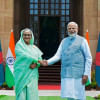The implications for China, the West and India

Let us start with the "election" that was held on January 7. A one-sided show has been enacted where all of the 299 parliamentary seats were won by either official Awami League candidates, or "dummy" Awami league candidates (independents, albeit with AL party chief's approval) or others, notably Jatiya Party, who were granted easy sailing by Awami League as a gift. The unofficial tally looks like this: Awami league and allies won 226 seats, independents 62, and Jatiya Party 11. The independents are basically Awami League members. In a few days, the incumbent government will be sworn in for the fourth consecutive term.
The run-up to the polls witnessed an unusual phenomenon. Powerful countries, far and near, have shown active interest in Bangladesh's election and have been polarised in a rather peculiar fashion. China and Russia wanted continuity, and supported the arrangement made by the ruling government that left no place for their defeat. India, a strategic partner of the US in containing Chinese ambitions, joined this process. A free and fair election risked an ouster of trusted incumbents, and India did not trust the opposition BNP.
On the other hand, the Department of State of the US said Washington was concerned by reports of vote irregularities, adding that the election was not free and fair. As we all know, they have been vocal about a free, fair and participatory election, and threatened to impose visa restrictions on those connected to a possible rigging of the polls. Besides, they also indicated a possibility of trade and economic embargo on the issue of labour rights. The US wants a strong foothold in Bangladesh in its global quest to contain China, and they thought that a government elected in a free and fair polls would be a better option for them. The US position is shared by the Western nations.
The election that has taken place is clearly not what the West in general and the US in particular wanted. The question now is what its ramifications on regional geopolitics would be. India's ties with the incumbent government remains paramount. However, Bangladesh's economy is struggling and will require an infusion of external funds, which India will be unable to provide. Therefore, a further tilt of the government towards China is a distinct possibility. India, in that case, will have to look on grudgingly, and remain satisfied with Bangladesh's assurance in containing the Indian insurgent groups (IIGs) in its northeastern states. Now that the election is over and a most predictable outcome has been recorded, what would the West do in the evolving situation?
There are basically two options before the West. One is, they can swallow their pride and continue business as usual with the Awami League government, as they did after the elections in 2014 and 2018. Even with some visa restrictions here and there, the Awami League might be able to weather that situation. India would be happy with that, since however much it may want to contain China, overwhelming US presence in its own backwater is anathema for the country. The problem for the US in this scenario would be creating a credibility gap in this region and beyond. That credibility has already taken a beating following their sudden withdrawal from Afghanistan.
The second option for the West is to impose widespread visa restrictions and some trade restrictions based on labour rights issues. This possibility cannot be ruled out altogether. If that does happen, Bangladesh's already distressed economy will see disastrous consequences with substantial loss of jobs. It is doubtful if the government will be able to overcome the odds, even with the support of China and India.
The best, most practical option for Bangladesh is, therefore, to interface with the West and establish normalcy in relations with them. For Bangladesh, there is no viable scope for a full-blown confrontation with the West.
M Touhid Hossain is former foreign secretary of Bangladesh.
Views expressed in this article are the author's own.
Follow The Daily Star Opinion on Facebook for the latest opinions, commentaries and analyses by experts and professionals. To contribute your article or letter to The Daily Star Opinion, see our guidelines for submission

 For all latest news, follow The Daily Star's Google News channel.
For all latest news, follow The Daily Star's Google News channel. 









Comments